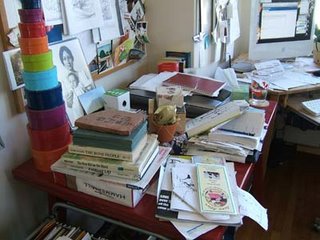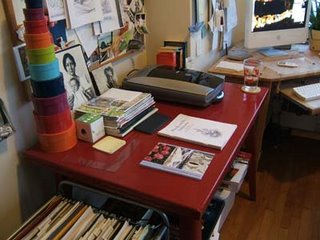
I've been meaning to update this post about my editing process for a while, as it's changed a bit in the last five years, mainly having to do with technology. Of course, in many ways my process has also remained the same, so I'm following the same general format/text of the original post. So, here goes:
The author will think I'm a horrible editor. They'll think the changes I'm asking for are absolutely stupid and unnecessary.
I get the same anxiety when I send off an editorial letter to an author as I've heard an author gets when he/she sends off their manuscript to an editor or reader. (Okay, well, maybe not "the same" but similar.) I don't want to hurt authors' feelings or anger them. I don't want them to think I'm incompetent, disrespectful of their work, or crazy. I have the highest level of respect for the creative people I work with, because I could never do what they do. I know they're putting their trust in me, trusting me to understand their work and help them make it better. And that's a lot of responsibility!
This anxiety is lessened significantly after I've worked with an author or illustrator for a while, because by then mutual trust has been established, but I do get that same anxiety when working with someone for the first time. I will say that overall, the anxiety has lessened the more experience I have. Although I do always think, "Just because an author has never called me up crying or screaming after receiving my edits, doesn't mean there can't be a first time!"
I hope that my editorial letters have the right balance of praise and constructive criticism. I know that it can be intimidating to receive an in-depth edit, which may include requests to overhaul the manuscript significantly, and to also make lots of annoying nit-picky changes. But I hope my authors know that I love their writing, love their work, and know that we're on the same team.
The task of writing an editorial letter to me is daunting, and I certainly had no idea how to go about doing it when I edited my first novel (sorry, Libby!). But I learned as time went on; I learned from my mentors, and I learned from reading the correspondence files that circulate in my department: each week, everyone in editorial (when we remember) places copies of our editorial letters and other outside business correspondences into a centralized folder which is then circulated throughout the editorial department so that we can be aware of other editors' projects, problems that other editors are having that may be similar to our own, and also so the junior staff can read many different editorial letters to start to understand how to write them. I found this to be a crucial learning tool when I was first starting out as an editorial assistant.
I think every editor develops his or her own editing style, and I've certainly honed my own throughout the years. My process is always changing slightly and is adjusted for specific books and authors, but here's my general process:
1) First, I read through the manuscript (this is my favorite part of the process!). I generally do this on my eReader, and therefore I make very few notes--I'm just reading for the experience. On occasion I'll jot down things I notice--usually broad, over-arching things--but I'm really looking to get a fresh read, and am reading for the overall experience as a final reader would. Is it enjoyable? Am I pulled into the book right away? Is the pacing off? Do I care about the characters? Does the plot make sense? Is the ending satisfying?
2) Then, if I can, I'll let it sit for a few days. Sometimes, right after the first read I think, "there's nothing I could do to improve that novel!" But inevitably things will come to the surface during that "sitting" time: issues with the plot or believability, questions about certain characters, solutions (suggestions, I should say) to problems I've been having with the book, resolution to how I've been feeling about the ending, etc. I also want to see if the book "stays with you"--do I remember it several days later?
3) After a few days, I'll sit down again with the manuscript on my computer and read through it carefully again, line by line. I do some line-editing now, although I think I'm generally pretty light overall in this regard. I'll call out sections or underline sentences that feel clunky or awkward and just aren't working for me, but rarely will I actually reword things myself--I'm not a writer myself, so I like to give the author the freedom to work it out themselves. I use the comment function in Track Changes the most, and on occasion I'll make a quick note and say "see letter" if I know I'll expand on my thoughts further. While I do this, I'm also jotting down notes in a separate Word document that I'll expand later into an editorial letter. If a section strikes me as particularly lovely or memorable, I'll make sure to mark that as well--praise is always good!
4) I'll go over my comments again while drafting the actual letter. This step not only allows me to clarify my notes for the author, but to also review my edits and decide if I still agree with them. I expand on issues I need to in an editorial letter, trying to offer several suggestions for how I think an issue can be solved as I go. I'll add and delete comments/edits as I go along. In terms of the editorial letter, I'll usually just type things out into a Word document chronologically (as they occur in the manuscript) first, and then later go through and reorganize it by topic--characterization, plot, pacing, believability--whatever I think the main issues are in the manuscript.
5) I tweak the letter a lot. Get it to the structure I want, and add the opening and closing. I always start and end the letter with praise and encouragement--this is very important! I also make sure to include a section making sure the author knows that these are my suggestions only, not demands, and that he/she should only make changes he/she is comfortable with. I print my letter out and edit it on paper two or three times until I think it's ready, and then send it off. If there's time, I'll ask my assistant to read over my letter before I send it to catch any typos or sections that are unclear. Then I email the letter and the marked-up manuscript to the author.
Now that I've moved to electronic editing, I've found that my editorial letters have gotten shorter--on average, 2-3 pages (in the past, I'd say the average length was 5-7 pages). This is mainly because of the freedom of Track Changes and comments--it used to be easier to put everything in the letter because of my atrocious handwriting, but now that I can type those comments, I find it easier to expand on my thoughts directly on the manuscript.
I fully expect authors to disagree with me sometimes, and if they offer me an explanation later to why they disagreed and didn't revise something, that's fine with me. Occasionally there's an issue that I feel especially strongly about, and in those cases, I'll keep requesting the change on subsequent revisions, reiterating why I think it's a problem. I'll bring in fresh readers to see if they have the same issues--if so, I'll bring it up with the author again. If not, I'll let it go. Generally, I won't ask more than three times. Ultimately, it's the author's work, and we can't force the author to make changes he or she is not comfortable with, or in agreement with.
This process repeats until the manuscript is "done." I'll usually bring in my assistant to edit the book alongside me for one or more rounds, depending on the project and how busy we all are. In this case, we'll both make comments directly on the manuscript, and I'll incorporate her comments into my editorial letter. Generally, the first editorial letters are more general, and as we go I get more nit-picky about the little things, and the last edit is just "clean-up" of all of the little things that are left. I've never taken less than two rounds, and on average it takes three or four, oftentimes more. Sometimes it feels like it's never really done to the author--they want to keep tweaking and revising. But I do get a sense that a manuscript has been taken as far as it's going to go, and can declare it done and get it into copyediting. I also like to get another editor who hasn't read it before to give a "fresh read" of the final or almost-final manuscript to make sure that we didn't miss anything glaring--at that point, both the author and I are so close to the manuscript, so a fresh read is an important step.
So, there you have it: my editing process. Of course, depending on the time crunch, sometimes this process is cut down--in later drafts, I'll combine 1 and 3 and delete 2 (when I'm reading a revision, unless there were many structural changes or major plot-point changes, the "fresh read" isn't as crucial a step). Or I'll combine steps 3 and 4. Or I'll cut down on how many times I edit my own letter.
I am an editor, and although editing is probably one of the most important parts of my job, I feel that it's only 10-15% of my job description/time put in. But as daunting as it sometimes is, I do relish it--it's my favorite part of my job. I love examining these works of art carefully, trying (and I emphasize "trying") to get to know the book as well as the author does. I do respect the work, even as I seemingly "rip it apart," and ultimately I just want to help the author get the work to the next level and get it ready to introduce to the world.
For you editors out there, is this close to your process? And for you authors out there, any comments or suggestions on how to improve the process would be welcome! How do you edit your own work? Also, has technology improved the process for you? Grace revealed at our IBBY panel that she preferred the old way--editing on paper. I may have to switch back for her! Do the rest of you prefer getting your edits on paper or electronically? Or over the phone or in person?


































